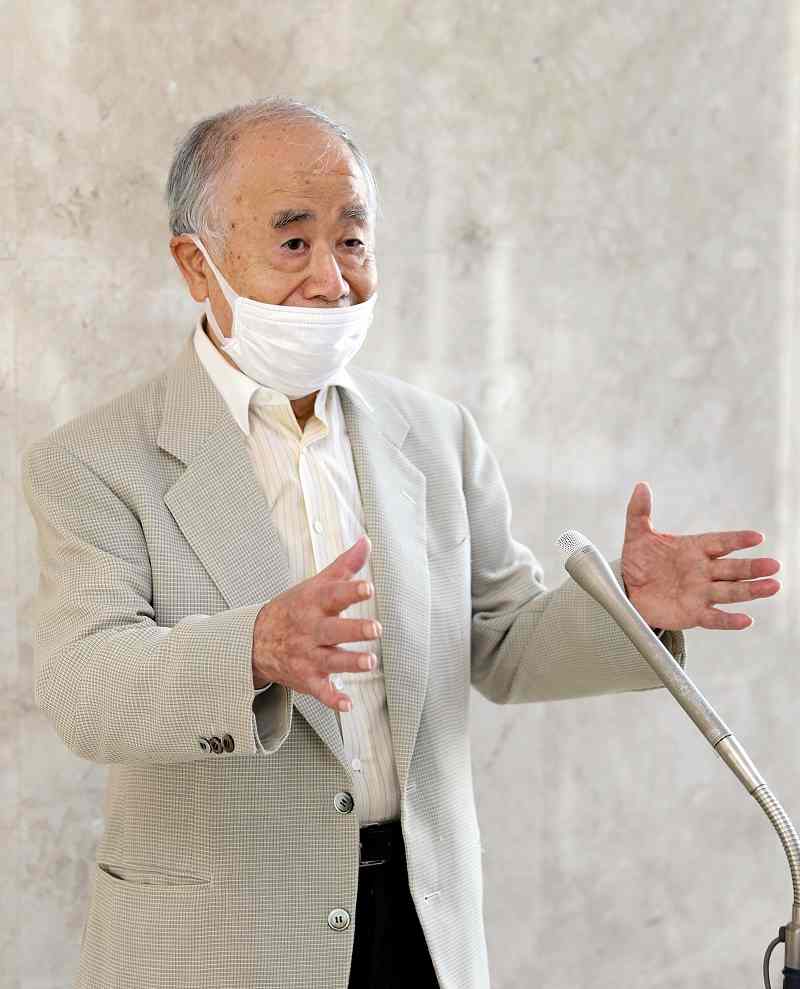Always ‘surrounded by yes-men,’ Japanese publishing bigwig caught up in Tokyo 2020 bribery probe

Kadokawa Corp. Chairman Tsuguhiko Kadokawa denies bribery allegations when asked about them by reporters on Sept. 5 in Tokyo.
16:00 JST, September 15, 2022
The bribery scandal involving sponsors of the 2020 Tokyo Games has led to several arrests, including that of major publisher and multimedia company Kadokawa Corp.’s chairman.
Kadokawa Corp. employees were shocked by the arrest of Tsuguhiko Kadokawa, a leading figure in the publishing world who served as a key member of an industry group and pushed ahead with the diversification of the company, including its participation in the Olympics business.
“I knew our company was focusing on the Olympics business, but I just can’t believe the chairman would be arrested,” said a Kadokawa Corp. employee on the way home from the company’s headquarters in Chiyoda Ward, Tokyo, on Wednesday, when Kadokawa was arrested.
Kadokawa, 79, is suspected by the Tokyo District Public Prosecutors Office of conspiring with former director and senior managing executive officer Toshiyuki Yoshihara and then general manager of the Games-related business Kyoji Maniwa to pay a total of about ¥69 million in bribes between September 2019 and January 2021 to Haruyuki Takahashi, 78, at the time an executive board member of the Tokyo Games organizing committee. Yoshihara, 64, and Maniwa, 63, were arrested on suspicion of bribery on Sept. 6, when Takahashi was arrested again as well.
The special investigation squad of the prosecutors office has determined that a total of ¥76 million was paid from July 2019 as a bribe by Kadokawa Corp. to a consulting company headed by Takahashi’s acquaintance, Kazumasa Fukami. Fukami, 73, was Takahashi’s colleague during their time at major advertising agency Dentsu Inc. and has also been arrested on suspicion of accepting bribes. The statute of limitations for charges related to bribery is three years, therefore the arrest charge on Kadokawa involves bribery amounting to the ¥69 million provided between September 2019 and January 2021.
In an interview with media in Tokyo on Sept. 5, Kadokawa repeatedly stressed that he had no knowledge of any wrongdoing.
“I don’t remember ever telling my employees” to do anything improper, Kadokawa said then. “I want to believe my employees.”
The next day, when Yoshihara and Maniwa were arrested, the public prosecutors began searching Kadokawa’s home and interviewing him several times.
“The chairman was like the emperor without clothes. It happened for a reason,” another Kadokawa Corp. employee said.
According to this employee, the chairman “surrounded himself with yes-men” who prevented inconvenient information from reaching his ears.
“When the chairman says he wants to do something, no one can say no,” the employee said. “I hope this incident will change the company’s culture.”



